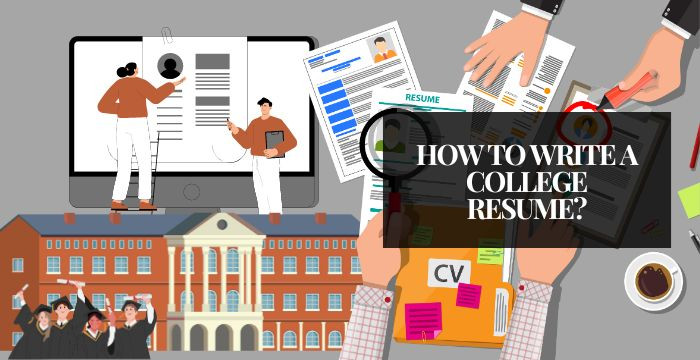
It is rightly said that no matter how much you hustle, the most crucial opportunities in your life will be determined by an A4-sized resume. In an era where the competition for securing admissions to colleges or getting internships and jobs is rapidly heating up, a college resume has become essential for standing out from the rest.
A college resume is a professional medium of showcasing your skills, experiences, and achievements to potential employers or admission committees to demonstrate why you are an ideal candidate for a job or academic opportunity. In this blog, we will explore the key elements of an effective college resume and provide you with valuable guidelines to craft a compelling document that strikes just the right cord.
What is a college resume?
Let’s begin by understanding this. A college resume is a concise document that summarizes your educational background, work experiences, extracurricular activities, honors and awards, and relevant skills. Unlike a traditional job resume, a college resume features your academic achievements, leadership roles, community involvement, and other experiences that exemplify your potential for success in college and beyond.
Why do you need a college resume?
A college resume primarily serves two objectives:
- To apply for graduate school or scholarships: When applying for graduate school or scholarships, a college resume helps admission committees or scholarship panels evaluate your capabilities and determine if you are a good fit for their program.
- To secure internships or part-time jobs: A well-crafted college resume can help you secure internships or part-time jobs that align with your academic and career goals. Employers often request resumes to assess applicants' qualifications and gauge their suitability for specific roles.
Key elements of a college resume:
- Contact Information: Include your full name, phone number, email address, and LinkedIn profile (if applicable).
- Objective/Summary Statement: Write a concise statement that highlights your career or academic aspirations and outlines the value you can bring to an organization or educational institution.
- Education: List your educational background, including the name of your high school, expected graduation date, GPA (if impressive), and relevant coursework. If you have taken any specialized classes or completed certifications, include them here.
- Work Experience: Highlight any part-time jobs, internships, or volunteer experiences you have had. Emphasize your responsibilities, achievements, and transferable skills gained from each position.
- Extracurricular Activities: Mention your involvement in clubs, sports teams, community service, or leadership roles. Highlight any notable achievements or responsibilities held within these activities.
- Projects, Presentations, Publications: Add significant academic or personal projects to portray your knowledge and capabilities in a particular field. You can also bring up your presentations or publications if it adds to the value.
- Skills: Include relevant skills such as computer proficiency, foreign languages, or certifications that apply to your field of interest. For example, proficiency in Microsoft Office Suite and Adobe Creative Cloud, fluency in Spanish and French, or being certified in First Aid and CPR.
You can also consider adding soft skills such as time management, communication skills, problem-solving, etc. However, make sure they are relevant to the purpose of your resume.
Guidelines for writing a college resume:
- Tailor your resume: Customize your resume for each specific opportunity by aligning your experiences and skills with the requirements of the position or program you are applying to.
- Choose legible fonts: Use fonts that are professional, easy to read, and widely recognized such as Arial, Calibri, and Times New Roman.
- Include Keywords: Use keywords from the job description or program requirements in your resume. This can help your resume get noticed by applicant tracking systems (ATS) used by many organizations.
- Use action verbs: Begin bullet points with action verbs to describe your accomplishments and responsibilities, such as "managed," "created," or “led.”
- Quantify your achievements: Whenever possible, include specific numbers or metrics to quantify the impact of your accomplishments. For example, instead of saying "organized events," say “organized and executed 5 successful fundraising events, raising $10,000 for charity.”
- Keep it concise: Limit your resume to one or two pages, focusing on the most relevant and impressive experiences. Use clear and concise language to communicate your qualifications effectively.
- Proofread and edit: Ensure that your resume is free from grammatical errors, typos, and inconsistencies. Ask a trusted friend, family member, or career advisor to review it for feedback.
One of the major factors for earning high scores in schools and colleges is acing assignments. If you need assistance in composing high-quality assignments, you can reach out to our experts at The Assignment Ninjas. Our board consists of domain-specific writers who ensure exceptional quality and well-researched papers tailored to your requirements. It can help you maintain a strong academic record and free up your time for studies and extracurricular activities.
To sum up, crafting an outstanding college resume is a vital step towards achieving your academic and career aspirations. By following the guidelines outlined in this blog, you can create an impactful document that highlights your strengths and presents you as an exceptional candidate. Remember to tailor your resume for each opportunity and continuously update it as you gain new experiences. So, go on to confidently showcase your qualifications and secure the opportunities you have always desired. Good luck!
